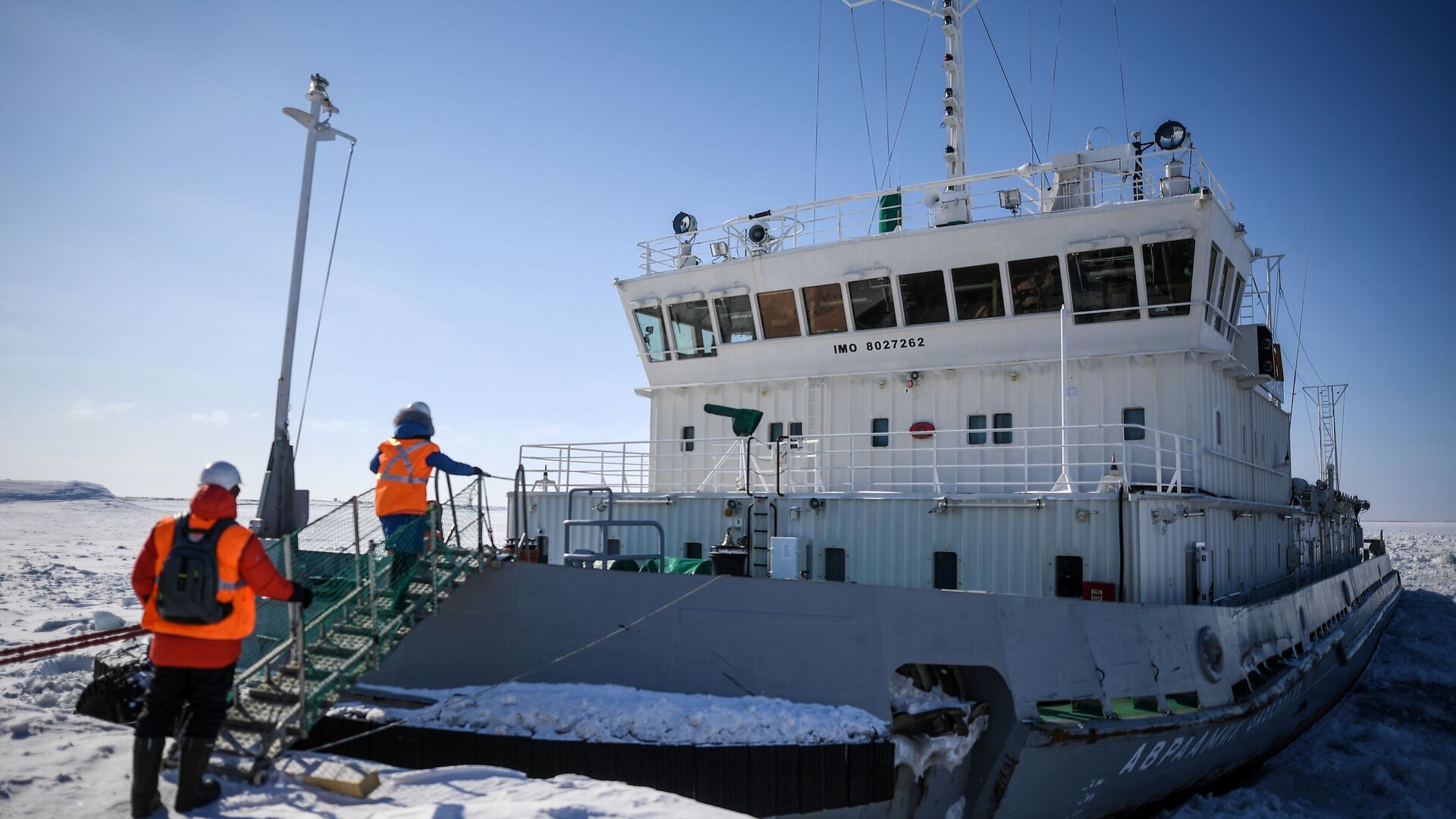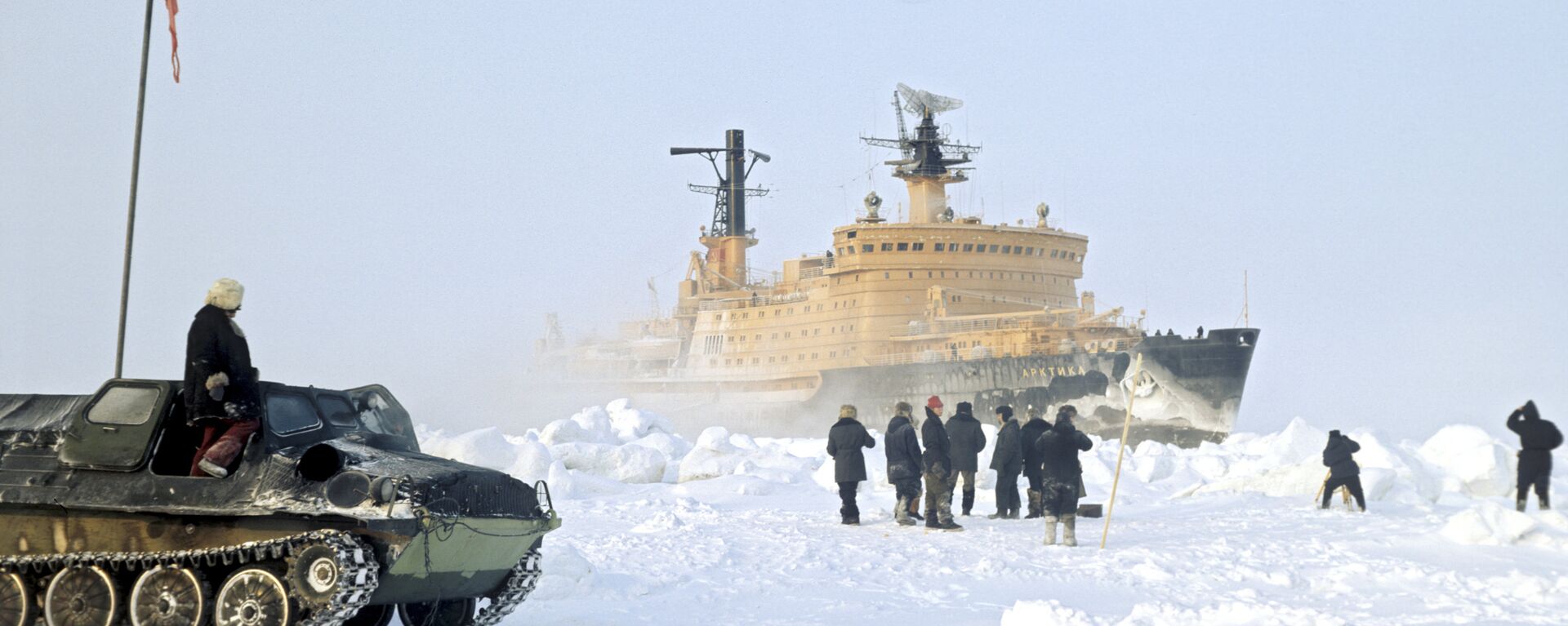https://sputniknews.in/20240523/arctic-cooperation-with-russia-critical-for-indias-long-term-interests-7437360.html
Arctic Cooperation with Russia Critical for India's Long-term Interests
Arctic Cooperation with Russia Critical for India's Long-term Interests
Sputnik India
The opening up of the Arctic Ocean due to global warming presents India with prospects of not only long-term and "stable energy supplies" for years, but also with supply of critical minerals which are in abundance.
2024-05-23T20:22+0530
2024-05-23T20:22+0530
2024-05-23T20:22+0530
indo-russian relations
s. jaishankar
india
russia
new delhi
ministry of external affairs (mea)
brics
the arctic
northern sea route (nsr)
critical minerals
https://cdn1.img.sputniknews.in/img/07e7/09/0e/4238556_0:133:3171:1917_1920x0_80_0_0_63c23b0100118eebf1a275cb9434e606.jpg
The opening up of the Arctic Ocean due to global warming presents India with prospects of not only long-term and "stable energy supplies" for years, but also with supply of critical minerals which are in abundance in the polar region, an Indian think-tanker has told Sputnik India.Russia has the biggest Exclusive Economic Zone (EEZ) among the eight Arctic Council member states, or the countries which share a border with the northern polar region.Sharma is one of the international speakers participating in a conference titled 'The Arctic and our Global Neighbourhood’, which is taking place in Petrozavodsk on 22-24 May. The event is being organised by Russian think tank Interregional Scientific Forum (ISF) and involves experts and think tankers from various countries.India has intensified its engagements in the polar region since the unveiling of the 'Arctic Policy' in March 2022.The Arctic Policy comprises six pillars-- strengthening scientific research and cooperation, climate and environmental protection, economic and human development, transportation and connectivity, governance and international cooperation and building of national capacity.India-Russia Projects in the ArcticCurrently, the two countries are involved in developing Vankor on Taymyr and Taas-Yuryax fields in Yakutia in Russian Arctic region, according to an article by Interregional Scientific Forum.Russia has also agreed to train Indian seafarers in Arctic waters at Russian Maritime Training Institute in Vladivostok, as agreed during the visit of Indian Ports, Shipping and Waterways Minister Sarbanand Sonwal to Russia last September.Significantly, New Delhi has expressed a keen interest in jointly developing the Northern Sea Route (NSR) passing through Russia's EEZ with Moscow.Besides Russia, New Delhi has also been carrying our joint projects in the Arctic Region with Norway, the current chair of the Arctic Council.According to India's Ministry of External Affairs, New Delhi opened its first Polar Research Station Himadri in Norway in 2008.In fact, a suggestion by Norwegian State Secretary Andreas Motzfeldt Kravik that the Arctic Council should "compartmentalise" the Ukraine issue with cooperation in the Council, made at the Raisina Dialogue in New Delhi in February, was welcomed by Indian audience."I think it is very important for all of us to at least try and compartmentalise some of these issues. I think we have been very successful... Even during the height of the Cold War, we engaged in sustainable fisheries cooperation with Russia. We still have fisheries collaboration in order to sustain those fish stocks... The Arctic Council should be effective in managing some of those issues," Kravik told the panel.BRICS Mechanism as an Alternative to Arctic Council?Sharma further suggested that a prolonged pause in the Arctic Council could prompt Russia to device another "mechanism" for carrying out scientific and exploratory projects in the Arctic Region."BRICS could be that platform. Something in this direction could be announced at the BRICS Annual Summit in Russia this year," the Indian expert reckoned.For Russia, China has emerged as a close partner in carrying in scientific and energy projects in the Arctic in recent years.Beijing's stakes in the polar region have been growing since it unveiled its Arctic Policy in 2018.
https://sputniknews.in/20240428/india-russia-in-talks-for-arctic-project-comparable-to-international-space-station-scientist-7238069.html
india
russia
new delhi
the arctic
middle east
persian gulf (arabian gulf)
china
norway
Sputnik India
feedback.hindi@sputniknews.com
+74956456601
MIA „Rossiya Segodnya“
2024
Dhairya Maheshwari
https://cdn1.img.sputniknews.in/img/07e6/0c/13/138962_0:0:641:640_100x100_80_0_0_2cb44360dbcdf6d84bf4b299cd045917.jpg
Dhairya Maheshwari
https://cdn1.img.sputniknews.in/img/07e6/0c/13/138962_0:0:641:640_100x100_80_0_0_2cb44360dbcdf6d84bf4b299cd045917.jpg
News
en_IN
Sputnik India
feedback.hindi@sputniknews.com
+74956456601
MIA „Rossiya Segodnya“
Sputnik India
feedback.hindi@sputniknews.com
+74956456601
MIA „Rossiya Segodnya“
Dhairya Maheshwari
https://cdn1.img.sputniknews.in/img/07e6/0c/13/138962_0:0:641:640_100x100_80_0_0_2cb44360dbcdf6d84bf4b299cd045917.jpg
arctic council, arctic council members, arctic council india, arctic ice melting, global warming arctic blast, global warming arctic ocean, northern sea route, russian oil supplies, russian oil exports, arctic oil drilling, arctic oil reserves, critical minerals in arctic, critical and rare earth minerals, rare earth minerals in arctic, india ev industry, india semi-conductor industry, russia india relations
arctic council, arctic council members, arctic council india, arctic ice melting, global warming arctic blast, global warming arctic ocean, northern sea route, russian oil supplies, russian oil exports, arctic oil drilling, arctic oil reserves, critical minerals in arctic, critical and rare earth minerals, rare earth minerals in arctic, india ev industry, india semi-conductor industry, russia india relations
Arctic Cooperation with Russia Critical for India's Long-term Interests
Russia's Arctic Region has reportedly vast untapped reserves of not only oil and natural gas, but also rare earth minerals having applications in critical and emerging industries such as AI, electric vehicles (EVs) and semi-conductors.
The opening up of the Arctic Ocean due to global warming presents India with prospects of not only long-term and "stable energy supplies" for years, but also with supply of critical minerals which are in abundance in the polar region, an Indian think-tanker has told Sputnik India.
Dr Raj Kumar Sharma, a senior research fellow at New Delhi-based think tank NatStrat, said that Russia has been increasingly looking for "friendly countries" for carrying out joint projects in the Arctic Region, which was partly due to the "pause" in the activities of the eight-nation Arctic Council in the wake of the Ukraine conflict.
"The Arctic energy resources are free from any kind of political instability, unlike in West Asia. It is a stable source of energy for India and we can look at the possibility of long term contracts," remarked Sharma.
Russia has the biggest Exclusive Economic Zone (EEZ) among the eight Arctic Council member states, or the countries which share a border with the northern polar region.
Sharma said that joint projects in the sphere of hydrocarbons, infrastructure development, connectivity, timber and mining could shape the future of India-Russia cooperation in the Arctic Region.
"India and Russia also need to diversify their relationship as the defence trade dominates the ties. So, Arctic is one such area that helps to diversify India-Russia ties," the academic said.
Sharma is one of the international speakers participating in a conference titled 'The Arctic and our Global Neighbourhood’, which is taking place in Petrozavodsk on 22-24 May. The event is being organised by Russian think tank Interregional Scientific Forum (ISF) and involves experts and think tankers from various countries.
India has intensified its engagements in the polar region since the
unveiling of the 'Arctic Policy' in March 2022.
The Arctic Policy comprises six pillars-- strengthening scientific research and cooperation, climate and environmental protection, economic and human development, transportation and connectivity, governance and international cooperation and building of national capacity.
India-Russia Projects in the Arctic
Currently, the two countries are involved in developing Vankor on Taymyr and Taas-Yuryax fields in Yakutia in Russian Arctic region, according to an article by Interregional Scientific Forum.
Russia has also agreed to train Indian seafarers in Arctic waters at Russian Maritime Training Institute in Vladivostok, as agreed during the visit of Indian Ports, Shipping and Waterways Minister Sarbanand Sonwal to Russia last September.
Significantly, New Delhi has expressed a keen interest in jointly developing the Northern Sea Route (NSR) passing through Russia's EEZ with Moscow.
"There is today a serious assumption that the
Polar Route could open up a different logistical pathway between India and Europe, which will go through the Indo-Pacific," Jaishankar told a foreign policy conference in New Delhi in February.
Besides Russia, New Delhi has also been carrying our joint projects in the Arctic Region with Norway, the current chair of the Arctic Council.
According to India's Ministry of External Affairs, New Delhi opened its first Polar Research Station Himadri in Norway in 2008.
In fact, a suggestion by Norwegian State Secretary Andreas Motzfeldt Kravik that the Arctic Council should
"compartmentalise" the Ukraine issue with cooperation in the Council, made at the Raisina Dialogue in New Delhi in February, was welcomed by Indian audience.
"I think it is very important for all of us to at least try and compartmentalise some of these issues. I think we have been very successful... Even during the height of the Cold War, we engaged in sustainable fisheries cooperation with Russia. We still have fisheries collaboration in order to sustain those fish stocks... The Arctic Council should be effective in managing some of those issues," Kravik told the panel.
Sharma highlighted that issues like climate change in the Arctic region were "common to humanity".
"It is unfortunate that the Arctic Council is not functioning. Even during the Cold War, the cooperation over the Arctic did not come to a halt. As an observer, India can only hope that the Arctic Council starts functioning again," the think-tanker stated.
BRICS Mechanism as an Alternative to Arctic Council?
Sharma further suggested that a prolonged pause in the Arctic Council could prompt Russia to device another "mechanism" for carrying out scientific and exploratory projects in the Arctic Region.
"BRICS could be that platform. Something in this direction could be announced at the
BRICS Annual Summit in Russia this year," the Indian expert reckoned.
For Russia, China has emerged as a close partner in carrying in scientific and energy projects in the Arctic in recent years.
Beijing's stakes in the polar region have been growing since it unveiled its Arctic Policy in 2018.



